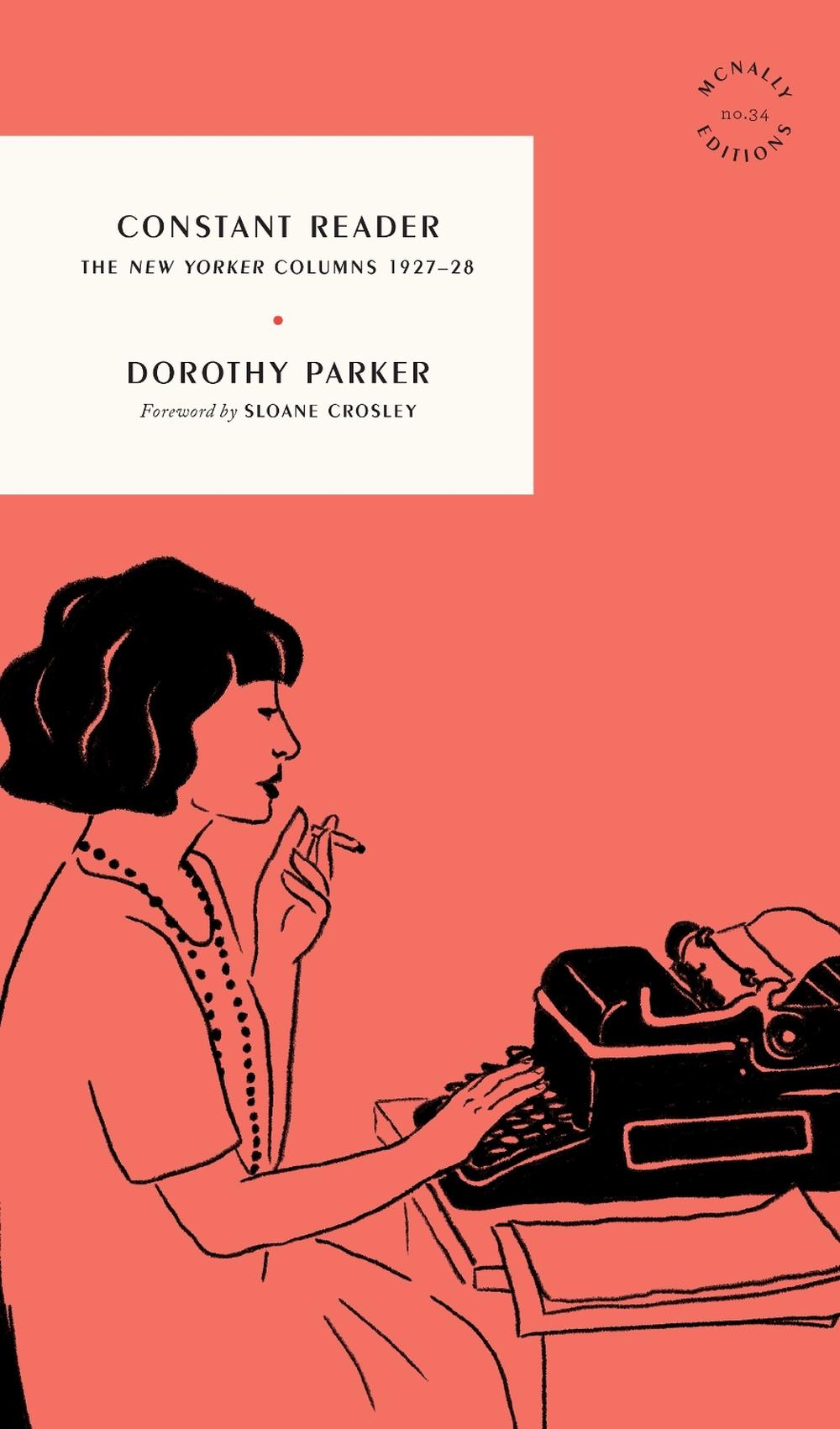
Constant Reader
the new yorker columns 1927-28
$31.53
- Paperback
224 pages
- Release Date
11 February 2025
Summary
Constant Reader: Dorothy Parker’s Cutting Wit on Books and Life
Dorothy Parker’s complete weekly New Yorker column about books and people and the rigours of reviewing.
When, in 1927, Dorothy Parker became a book critic for the New Yorker, she was already a legendary wit, a much-quoted member of the Algonquin Round Table, and an arbiter of literary taste. In the year that she spent as a weekly reviewer, under the rubric ‘Constant Reader’, sh…
Book Details
| ISBN-13: | 9781961341258 |
|---|---|
| ISBN-10: | 1961341255 |
| Series: | McNally Editions |
| Author: | Dorothy Parker, Sloane Crosley |
| Publisher: | McNally Jackson Books |
| Imprint: | McNally Jackson Books |
| Format: | Paperback |
| Number of Pages: | 224 |
| Release Date: | 11 February 2025 |
| Weight: | 276g |
| Dimensions: | 22mm x 216mm x 129mm |
You Can Find This Book In
What They're Saying
Critics Review
“Does anyone know how hard it is to be that funny? … Read her book reviews. Read them now and see how good they are.”
—Fran Lebowitz
“In Parker’s hands, the humble book review becomes an instrument as expressive as a lyric poem.”—Nicholas Frankel, The Wall Street Journal, Five Best Books by Great Wits
“All I wanted in this world was to come to New York and be Dorothy Parker. The funny lady. The only lady at the table. The woman who made her living by her wit … Who always got off the perfect line at the perfect moment, who never went home and lay awake wondering what she ought to have said because she had said exactly what she ought to have.”—Nora Ephron, Esquire
“The Constant Reader columns are not really book reviews; they are standup-comedy routines. You don’t have to listen to her opinion, she says. If she didn’t like the book, maybe that’s just her hangover speaking.”—Joan Acocella, The New Yorker
“I was far more beguiled … by her New Yorker book reviews … [They] contain the best of what we’ve been trying to do all these years—we ‘booksy‐wooksies,’ as she called us. She snuck into the tradition with a razor in her stocking, and we’ve been trying to slice things her way ever since.”—Christopher Lehmann-Haupt, The New York Times
“Can anyone ever get too much of Dorothy Parker? … Here is the happy news that McNally Editions is republishing her book column “Constant Reader,” from The New Yorker, a gig that lasted only a year but whose critiques read as fresh and as wonderful as when they first appeared, in the late 1920s … Sloane Crosley provides a witty and perceptive foreword.”—Jim Kelly, Air Mail, Editor’s Picks
“Parker’s column helped to establish the New Yorker voice; wry, puckish, world-weary … When she turns to the books themselves, she is of course very funny, with jokes sustained over paragraphs, pages and months … This is the Dorothy Parker we recognize: glittering, at the peak of her humorous powers, in an eternal pre-Depression New York.”—Violet Hudson, Times Literary Supplement
“What gives her writing its peculiar tang is her gift for seeing something to laugh at in the bitterest tragedies of the human animal.”—Somerset Maugham
“A bestselling poet who moved on to fiction, Dorothy Parker … was equally innovative as a critic, pioneering a first‑person style and busting the taboo on hatchet jobs by women … She was arguably the first female celebrity wit since the 17th century, outperforming her illustrious male peers.”—John Dugdale, The Guardian
“Constant Reader contains the kind of wit that no longer flourishes. I laughed loudly throughout and sobbed softly in memory. There would be fewer bad books published today if Mrs. Parker were alive to have at them.”—George Oppenheimer
“Length doesn’t increase depth, necessarily, and just because her little characterizations of a book were short doesn’t mean they weren’t true.”—Gloria Steinem
About The Author
Dorothy Parker
Dorothy Parker nee Rothschild (1898-1967), grew up on New York’s Upper West Side. She became famous for her comic poems, her short stories, her reviews, and her repartee, as recorded by the columnist Wolcott Gibbs over lunches at the Algonquin hotel. A prolific magazine contributor in her youth and a successful screenwriter (she co-wrote the original A Star is Born), she struggled all her life with alcoholism and wrote very little in her later decades, though continued to be a vocal champion of progressive causes, especially civil rights.
Sloane Crosley is the author of the essay collections I Was Told There’d Be Cake (a 2009 finalist for the Thurber Prize for American Humor), How Did You Get This Number, and Look Alive Out There (a 2019 Thurber Prize finalist); the novels The Clasp and Cult Classic; and, most recently, her memoir, Grief Is for People. A contributing editor at Vanity Fair, she lives in New York City.
Returns
This item is eligible for free returns within 30 days of delivery. See our returns policy for further details.




